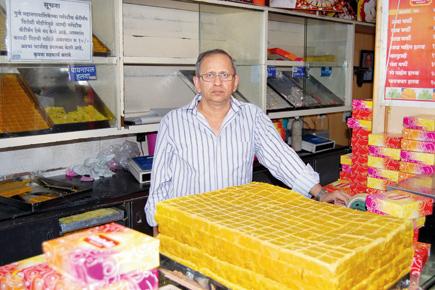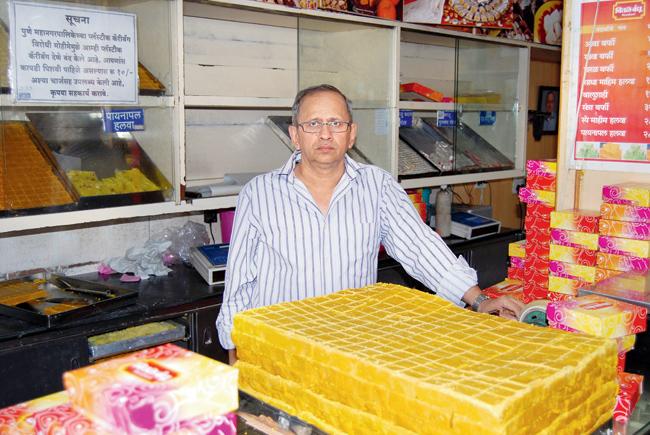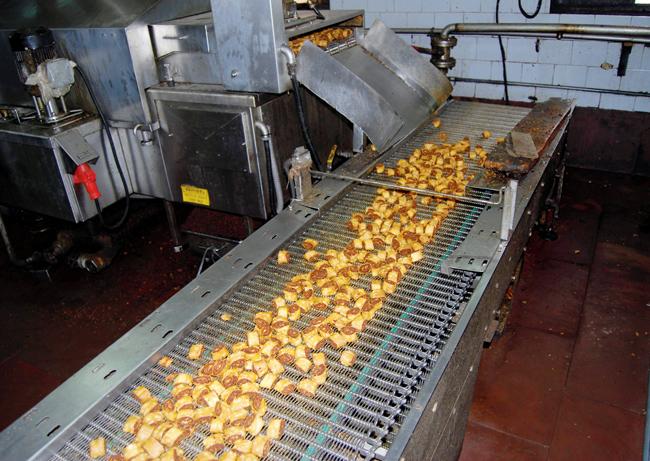As they enter their 65th year, Saurabh Datar finds out how Pune’s legendary sweetshop — Chitale Bandhu Mithaiwale, of bakarwadi fame — has maintained its traditional taste despite adopting modern technology

Pune's legendary sweetshop, Chitale Bandhu Mithaiwale, bakarwadi, Shrikrishna Chitale, Pune food
Amid the din of honking vehicles at Pune’s Bajirao Road, in a city replete with cultural and culinary legends, is an institution in a league of its own. Chitale Bandhu Mithaiwale is renowned for its quality and consistency in taste. Its patrons swear by its shrikhand, amba barfi, peda; its bakarwadi sells in several countries across the world. Even its most vocal critics — if they even exist — would be hard-pressed to point out a flaw in their products.

Partner Shrikrishna Chitale at the Bajirao Road branch of Chitale Bandhu Mithaiwale. The company has 12 franchisee outlets in Pune. Pics/Tanmay Chitale
“We actually started out as a dairy in Bhilawadi, Sangli, in 1939, which was established by my grandfather, Shri Bhaskar Chitale. My father, Raghunathrao (Bhausaheb) and his brother Rajabhau, opened the shop in 1950,” says Shrikrishna Chitale, a partner in the family-run company. The dairy is the bread-and-butter business for the group, selling nearly 3.75 lakh litre of milk every day in Pune. Their sweets and savouries, with an annual turnover of Rs 300 crore, give the brand most visibility — with bakarwadi leading the pack. Patrons flock to their two main shops and 12 other franchisee outlets in hordes.
ADVERTISEMENT

In the 1980s, to satiate Pune’s ever-growing appetite for its bakarwadi, the Chitales modified a machine that made Chinese spring rolls. Today, their two bakarwadi plants produce three ton of bakarwadi every day
While most sweetshops in Pune are predominantly North Indian or Gujarati, the Chitales have stuck to their roots. “We cater to Maharashtrian taste buds. That is our speciality. All our recipes are homemade and first tried out by us,” explains Shrikrishna. The distinct flavour of the Chitale shrikhand owes its timelessness to the chakka (strained curd) recipe created by Shrikrishna’s grandmother Janaki. She painstakingly regulated the amount of milk and temperature used in the recipe to achieve the desired taste. Shrikrishna’s mother, Vijaya, and his aunts supervised the preparation for farsan and sweets. Such scrupulousness has reaped rewards — Pune’s discerning population adores the Chitales and is brand-loyal.
Mandar Lawate, a Pune historian, says, “Though sweetshops have been in Pune since the time of the Peshwas, the Chitales have successfully maintained their quality over the years. People still prefer their chakka because of its superior quality and sustained freshness. You will not find a stale product at the Chitales.” Shalaka Joshi, a college student, echoes the same sentiments. “I’ve been eating Chitale sweets and bakarwadi since childhood. None can match their quality.”
Tradition in technology
In the holy month of Shravan in 1950, the Chitales began selling sweets and dairy products. Soon, they added farsan to their menu. Catering to the increased demand, the family set out to improvise their offerings. Bakarwadi was a result of such a quest. Although a Gujarati snack, Raghunathrao, who had lived in Surat, decided to introduce it in the shop. “In Gujarat, they didn’t use garlic in bakarwadi. We modified the masala to suit the Marathi palate,” recalls Shrikrishna. The product, which entered the market in the ‘70s, was an instant hit and began selling out every day.
By the ‘80s, they realised they wouldn’t be able to satiate people’s appetite for it. They began hunting for a machine to automate the process. At a food fair in Germany, Rajabhau came across a machine that made Chinese spring rolls. It was worth a try; after several attempts in Sweden and The Netherlands, a Dutch machine proved its mettle. Shrikrishna and his cousin, Sanjay, personally tested, and tasted, these bakarwadis. Fryers, which were used in McDonald’s, were ordered from Germany. By the early ‘90s, the delicious bakarwadis had rolled out onto the conveyor belt. “We ensured the taste remained the same — the ingredients, the texture, the crunchiness has not changed over the years,” asserts Shrikrishna.
Soon, pedas, laddoos and gulab jamuns followed suit. The Chitales’ affinity for technology meant they introduced a Radio Frequency Identification (RFID) billing system in their shops. On entering the shop, you’re given a big slate with an in-built RFID chip. Inside, the employee feeds the list of items the customer has chosen. At the billing counter, a reader pulls out this list and generates the bill in seconds.
The glocal sweet shop
Three years ago, the Chitales went online. You can now order sweets, bakarwadi and other products on the Internet via a third-party website, and get it delivered anywhere in the world. According to Kedar Chitale, Shrikrishna’s 36-year-old son who looks after marketing and exports, their products are bought in USA, Singapore, the Middle East, Australia, New Zealand and Mauritius. “We even had customers in Israel, but due to the political situation there, the importer began having problems,” says Kedar.
One thing the Chitales have maintained is their strict, no-preservatives policy, even when it comes to their sweets. The group has employed four food technologists to run tests on how shelf life of perishable products can be increased. Kedar adds, “We constantly give out small projects, asking people to help us solve process or packing issues. That helps us lengthen our shelf life.”
The company is also experimenting with aseptic packaging, something, Kedar says, will give sweets a shelf life of up to three months. In this, products are stored in imported packaging under controlled temperatures.
The Chitales plan to have around 25 franchisees in Pune in the next two years. Spreading their footprint across the nation, too, is priority. Life will come full circle for their bakarwadi as the Chitales expand to Gujarat. New products, such as paneer, cheese, flavoured milk have been added to the sales list.
Rumour has it that legendary singer, Asha Bhosle, once showed up at the shop between 1.15 pm and 3.30 pm, when the Chitale shutters are pulled down. No amount of cajoling or name-dropping can get them to open shop. Bhosle apparently wanted their bakarwadi urgently, and was ready to pay a premium price; but the Chitales didn’t relent. She went home empty-handed. I ask Shrikrishna if this story is true. “It’s possible. You have to decide how much you want to work. Nobody else should decide that for you,” he says nonchalantly.
I show him a joke about them doing rounds on WhatsApp: ‘Even Rajnikanth can’t get the Chitales to open shop during the afternoon’. Shrikrishna smiles and shrugs, as if to say some things must not change.
 Subscribe today by clicking the link and stay updated with the latest news!" Click here!
Subscribe today by clicking the link and stay updated with the latest news!" Click here!







